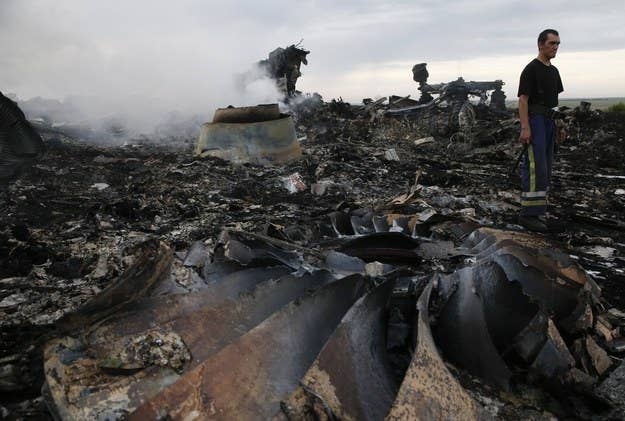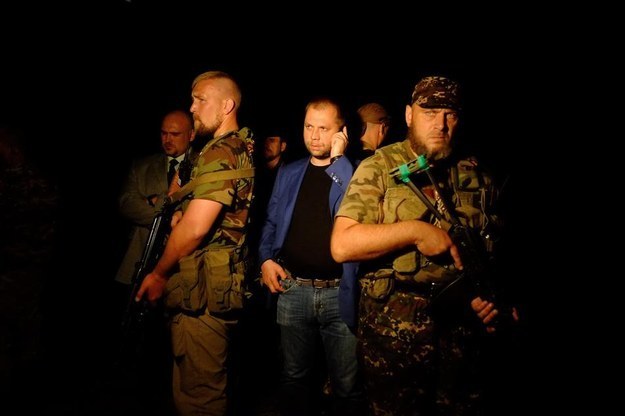This article was updated at 11:05 a.m. ET

An account from the Ukrainian armed forces in the country's war-torn east of Thursday's plane crash jibed with the flight path as it was tracked on computer screens. Soldiers stationed in the region saw Malaysian Airlines flight MH17 pass overhead normally — "in a controlled manner," said a spokesman for the armed forces, Vladislav Seleznev — as it followed its route from Amsterdam to Kuala Lumpur. Then it fell from the sky. The plane crashed near a town called Grabovo in the Donetsk region, not far from the Russian border, scattering wreckage and the remains of its 298 passengers across miles of terrain.
The plane was felled by a missile fired from the ground — that much has become clear, but not much more. All three of the parties who could have fired the shot — the separatist rebels, the Ukrainian government, as well as Russia, which has troops massed on the border nearby — denied responsibility. And a battle to establish the facts kicked quickly into full gear: Seleznev said rebels had rushed to secure the crash site and sent their own investigators. "This area is under rebel control, and Ukrainian forces don't have any access to investigate the case," he said.
He also claimed rebels had taken the plane's black box, the flight data recorder that, once the shock and horror of a plane crash settles, becomes the focus of investigators and bereft families alike as they grasp for answers. Yet even the device's fate remained unclear as a chaotic new day got underway. While some initial news reports said rebels had taken it and were sending it to Moscow, others on Friday said the black box had been retrieved by Ukrainian authorities, or at least that a second one had.
Either way, clear answers — and especially ones that might be accepted by both sides — will likely prove hard to come by. Alexander Borodai, the Russian citizen who acts as prime minister in the separatist republic rebels have declared in Donetsk, said in a phone interview that he had sent investigators to Grabovo shortly after the crash on Thursday and would perform their own inquiry. He had been to the site himself, he added. Then he issued the denial that has become the rebel narrative: that they don't have the kind of missiles that could reach the height of a civilian aircraft flying at an altitude of 33,000 feet. This would be "impossible," he said.

According to reports in the sympathetic Russian media before the crash, and allegedly to the rebels' own social media posts, rebels had recently captured from the Ukrainian army exactly the sort of weapons suspected in the attack: Russian-made SA-series missiles, known locally as Buk missiles. If true, it would put the rebels in the same league as the Russian and Ukrainian governments as a force with the capability of downing the plane. Shortly after the crash, however, pro-Ukraine journalists and commentators began warning that these posts were being deleted from social media. So was a post on the Russian version of Facebook, said to be from the rebel defense minister, another Russian citizen, in which he boasted shortly after the crash of downing what he thought to be a Ukrainian military plane.
It remains unclear if these posts are real, or just another part of the raging information war that has engulfed the conflict in eastern Ukraine from the outset, and will surely pull in the MH17 crash as well. The same caveat applies to audio of phone calls released by Ukrainian security that purports to show rebels boasting among themselves of downing the plane — and then recoiling in horror when they realized that it was a passenger airplane, not a Ukrainian military jet, that had smashed into the earth.
View this video on YouTube
Audio that reportedly shows rebels claiming they downed the plane
Rebels don't have their own air power, but they have used sophisticated surface-to-air missiles, turning them on lower-flying Ukrainian military planes and helicopters to deadly effect throughout the conflict. Experts say such weapons couldn't have reached MH17 — but rebels remain the only party on the ground in eastern Ukraine that has shot aircraft from the sky. Before the crash on Thursday, the Ukrainian government had accused Russian forces near the border of downing one of their military jets the day before, which would be a major escalation in the war, but the rebels had insisted they were behind it.
All sides were quick to promote their regular narratives for the conflict. Russia said Ukraine was to blame for the situation in the east, while the rebels said it was Ukrainian forces that had downed the plane, even suggesting it may have been a false-flag attack to prompt an international response against pro-Russia forces.
Ukraine's president, meanwhile, insisted that rebels were to blame — he called the downing of the plane a "terrorist act," quick to use his usual frames for the conflict.
The U.S. has yet to officially assign blame for the attack, but U.S. intelligence has determined that it came from a surface-to-air missile, likely a Buk, and a Department of Defense official told the Wall Street Journal that the U.S. believes the rebels fired it.
Whoever is to blame, signs so far point to the attack as a tragic accident, with the plane targeted in the belief that it was a military aircraft, and not a deliberate terror attack. Putin has called for both sides to put down their weapons and enter peace talks. Putin has made similar calls before, and it remained to be seen whether the move was genuine — or if it would have any effect on the ground. International condemnation against Putin mounted throughout the day on Friday as foreign leaders demanded that he walk back his support of the rebels.
Yet facts on the ground seem destined to get wrapped up in what has been a heated and often cynical battle for information ever since the Ukrainian conflict began — back when Russian President Vladimir Putin denied that his troops were in the country even as they were busy seizing Crimea in February and early March. The Organization for Security and Cooperation in Europe said on Friday that rebels had granted its observers access to the crash site, but the news came after much of the evidence, such as missile fragments that may show the attack's origin, could have been removed.
Borodai told BuzzFeed on Friday afternoon that "there is no evidence so far" about who fired the missile, but that rebels were trying to make the investigation as open as possible. He said he was sure, however, that rebels weren't to blame. "This tragedy will bring more attention to the conflict, but it's not realistic to say that the conflict will stop," he said.
Other rebels said they were sure that Ukrainian forces were to blame. "This is a provocation by Kiev to blame us for terrorism," said a commander of the rebel Russian Orthodox Army who goes by the nickname Veren. "It's already proven," he added, saying that he'd seen a report implicating Kiev in the attack on social media.
"The only thing that's clear is that nothing is clear," said another rebel in Donetsk, who gave only the name Sasha. "The rebels are blaming Kiev and Kiev is blaming us."
Even if the rebels eventually admit to the attack — or another side does, if that proves to be the case — hopes that the silver lining of the crash might be a de-escalation of the conflict will likely be hard to realize. The U.S. and its allies have only stepped up their criticism of Putin for aiding the rebels with money, military supplies and even, they say, covert troops on the ground. International condemnation has likewise been widespread, as the front pages of global newspapers showed on Friday. There were reportedly at least 10 different nationalities aboard the plane, including 173 people from the Netherlands, 44 Malaysians, 27 Australians, and smaller numbers from Indonesia, the United Kingdom, Germany, Belgium, the Philippines, Canada and New Zealand. Many of the passengers were AIDS researchers, on their way to a conference in Australia.
But Putin remains both heavily invested in the conflict and evasive about Russia's true role in it. In fact, in the days before the MH17 crash, the conflict had only escalated. The U.S. announced sweeping new sanctions aimed at Russia on Wednesday, with the European Union taking lesser steps as well. And in addition to the Ukrainian claims that Russia had downed its jet, the top NATO commander for Europe had flagged videos purporting to show Russia firing grad rockets into Ukraine from across the border, aimed at Ukrainian troops, which he called a "worrying" development.
"I wonder how Europe is going to react. I hope NATO steps it up, for fuck's sake," one angry, pro-Kiev resident of eastern Ukraine said. But the same risks and hesitations for engaging Russia remain in a conflict that the Obama administration has said won't lead to American troops on the ground. That leaves the conflict much where it was before the MH17 crash, just with greater tragedy: a continued cycle of violence and the hope that Putin will move to calm it.

